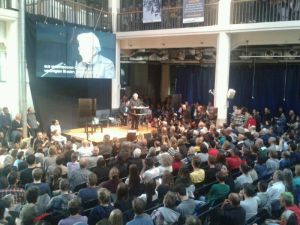Chomskywatching
/Seeing Noam Chomsky live is not something I expected to do in my life, but now I did and the inspiration his words generated in me lead me here. Why?

Although I’m a fan of Chomsky, I’ve not yet become a huge fan simply because I haven’t
been following his writing as much as other writers, like
and Howard Zinn. But I was intrigued by what I knew and after reading several of his essays I realized that he could become another hero for me. Seeing him talk about a huge variety of topics reinforced that impression.Still, why?What he does is the thing I set out to do as a teacher, mainly uncovering some truths that most people don’t want to see. In his talk he repeatedly made clear that what he is talking about are no secrets but known public facts. Still, bringing those facts out in the open and discussing them makes him being regarded as ‘radical’ or ‘leftist’ or ‘extreme’. But the problem lies not in what he is saying but in what people don’t want to hear. It’s very easy to write his ideas off as exaggerated mainly because it’s much harder to work against the common story we are being told by everyone else. But just like Quinn and Zinn he forces people to question those stories and to look behind the curtain of our cultural mythology.
Before I go into more detail what he was actually talking about, I wondered about the masses of people watching his speech. If they all took his ideas seriously, a revolution would start tomorrow, right there in Karlsruhe. Since that obviously won’t happen, it’s amazing to think about how many people decide to hear him talk so convincingly about those issues but still have no problem ignoring what he is actually saying. Ignorance is only bliss if bliss means running through life with blinders and accepting suffering as normal.
Some of his ideas that I took away from his speech:
- American policy is and was mainly driven by sustaining their own power, no matter what.
- The Vietnam War is not so much an exception, but the most public example of American policies throughout the century and until today.
- Looking at Barack Obama’s résumé before he was elected, there is no reason to be disillusioned because there never was a reason for the illusion in the first place.
- South America has become one of the most 'free' continents after a century of American domination.
- There is a huge amount of money spent on perpetrating certain ideas, even if they are scientifically false, to create propaganda that helps companies and the government to follow their goals, especially concerning national security, environmental problems and nuclear threats.
There is much more, of course, but what impressed me most, beside the fact that he tried to make clear how hard it is to tell actual truths, is how much he emphasized that we can change all of those problematic issues he talked about. He made clear that throughout our cultural history, movements were able to change things. There will always be resistance from the the ones in power and sometimes the movements fail, but there are many examples for success (just recently Arab Spring and Occupy). That’s what makes him so special to me, now even more after seeing him talking about several issues but always coming back to this idea: there is hope but it’s completely up to us. Since that is one of the major reasons why I’m still feverishly doing what I’m doing as a teacher and writer, he easily got me there.
Again, it’s not just: “There is always hope”, it’s more that you really have to do something. That still often intimidates people because of the possible risks and the fear of not achieving anything. But what I’ve learned is that three simple steps help starting some change in some people’s minds which is the only place where change can start from.
- Speak up.
- Ask/Question.
- Answer.
If you don’t say something about things that bother you, no one will hear you. If you ask questions no one else is willing to ask or if you question things everyone takes for granted, you force people to reflect upon them. If you give answers, you give people an alternative, a different way. Just criticizing or complaining is not enough, you need to have a vision (Daniel Quinn taught me that more than anyone else). Still, step 1 and 2 are much easier and still powerful enough on their own to achieve something. I’m no 85-year-old famous Chomsky, but I personally know that this is true.

